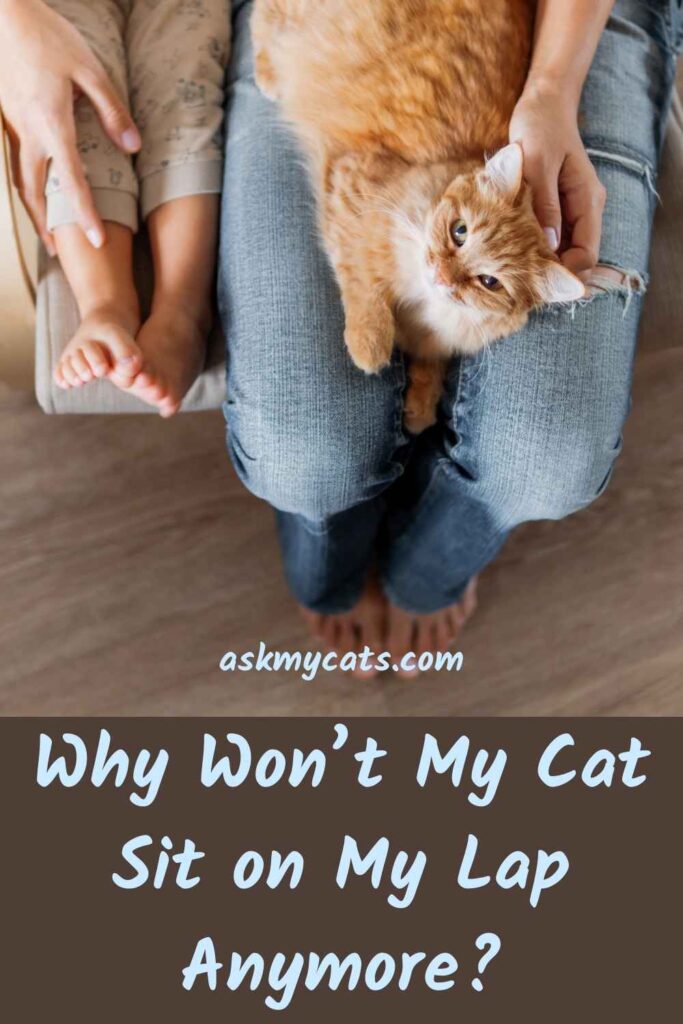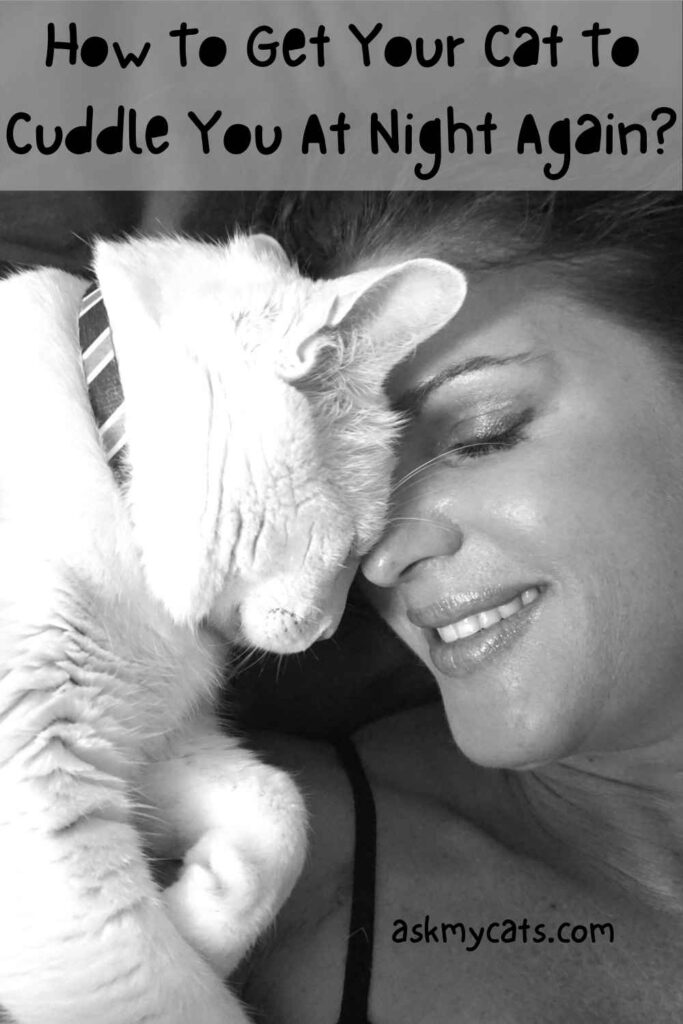Cats have a wide spectrum of emotions and sensations.
However, one of the most perplexing aspects of feline personalities is when a cat’s conduct toward you abruptly shifts.
This may give the impression that your cat has lost interest in you.
If you’ve ignored or scared your cat, it may be furious with you. Similarly, your cat will grow afraid as a result of an accident. A bad environment and a lack of mental stimulation are both likely to make your cat unhappy.
Your cat, on the other hand, may become irritable and aloof as a result of a sickness or injury, and target these sentiments towards you.
While it’s natural to believe that your cat is enraged by you, this isn’t always the case.
Cats might appear angry or unhappy for a variety of reasons, prompting them to aim their hostility and worry at you.


Give Your Cat the Perfect Day
Get the Free Ebook!
Why Does My Cat Hate Me All of A Sudden?
Cats don’t keep grudges, but if they have a cause to, they become distant and reclusive.
Cats are usually not upset at you, but with your conduct.
Unfortunately, there are various probable causes if your cat begins to act strangely around you.
To discover what’s upsetting your pet, you’ll have to conduct some detective work.
Cats seldom focus their feelings on one person in particular, although it’s tempting to believe they do.
You could think your cat has lost interest in you if it:
- When you call it, it ignores you.
- When you approach, he flees and stays away from you. He hides more frequently.
- Comes close to you just for food Scratches on furnishings
- Have any mishaps in the house?
- When you approach, he hisses at you.
- When you try to stroke it, it bites you.
To assist you in determining the source of this behavior, below are the most typical reasons why your cat may appear to suddenly despise you:

1. Afraid of You
If your cat forms bad associations with you, it may be afraid of you and may lash out or hide.
These relationships can be caused by a variety of factors, including you:
- I yelled at your pet.
- A loud noise was made.
- I injured it by accident.
- I completely forgot to feed it.
- It was imprisoned in a room.
You did something that bothered your cat, which resulted in tension. For instance, suppose you went to the vet with your pet.
Even if you aren’t aware that you have angered your cat, you may need to take action to regain his confidence.
If your cat hides, don’t bother it until it’s ready to emerge. In the meanwhile, attempt to figure out what’s causing your cat’s anxiety and take the necessary actions to prevent it from happening again.
2. Feels Neglected
Most cats want love in some way or another. Even the most aloof animals like a good snuggle now and again.
If you’ve been ignoring your cat or failing to give it the attention it needs, it may start to avoid you.
There are a variety of reasons that might make your cat feel neglected, including:
- Not cleaning the litter box on a regular basis
- Failure to adhere to a regular eating schedule
- Punishment for your cat
- Providing insufficient mental stimulation
- Ignoring your cat’s discomfort
- Not combing or grooming its coat adequately. This is especially true for long-haired cats.
If you bring a new animal into the house, your feelings of neglect are likely to be magnified. If you buy a new pet, remember to show your cat the same amount of care to keep it from being jealous.
3. Health Condition
It’s possible that your cat’s unusual behavior has nothing to do with you. It might be an indication that it is ill.
While disease symptoms vary depending on the health of the cat, the following are the most typical indicators of disease:
- Hiding and refusing to eat
- Loss of weight
- Vocalizations that are excessive
- Hiding in plain sight
- Pain that may be seen
Cats, however, are masters at concealing their misery.
They make themselves look as healthy as possible to avoid other animals picking up on their illness or injury, which makes them vulnerable to predators.
Sick cats are less likely to engage with their owners.
It may appear as though your cat is deliberately staying out of your way before you discover something is wrong. Take your cat to the vet as soon as possible to receive the care it needs.
4. Pregnant
Some cats become more friendly and needy during pregnancy, according to VCA Hospitals. Others get enraged and hostile. This is due to their hormone altering.
Pregnant cats are also more weary than normal, especially in the later stages of their pregnancy, which might make them appear to be avoiding you.
If you’re not aware that your cat is expecting kittens, you’re more likely to interpret this behavior negatively.
The following are signs of a pregnant cat:
- Its heat cycles come to an end.
- The nipples appear engorged and swollen.
- The cat starts to eat more than normal.
- Vomiting often
- Looking for safe havens to hide in
- A bloated stomach
If your cat begins to act aggressively toward you or runs away from you more frequently than normal, take it to the doctor to be sure it isn’t pregnant.
It’s interesting to read about why is my cat suddenly sleeping on top of me
5. Lack of Mental Stimulation
Cats who are bored become irritable and aggressive. This is due to the fact that they have no other way of releasing their stored energy.
While cats spend most of their time napping, when they are up, they like playing with their toys and exploring the outdoors. They’ll turn destructive if they can’t do this. They may possibly do you harm.
Start playing with your cat using its favorite activities and toys to prevent this tendency. In some circumstances, this is all the cat need to return to being content with you.
However, don’t be shocked if regaining its trust takes a bit more time and work.
6. Unsuitable Environment
If their surroundings aren’t comfy enough, cats grow unhappy.
Cats require the following to be happy and healthy:
- A comfortable location to sleep
- A pleasant sleeping environment
- Having access to a clean toilet is essential.
- Uninterrupted access to clean water
- Food served at regular intervals
- There are several hiding spots.
- A scratching post and a variety of toys
- Running, jumping, and climbing opportunities
- A risk-free environment is one that is free of dangers.
Cats are territorial and bond with their surroundings.
They grow nervous and nervous if the conditions aren’t right, showing actions that make them appear as though they’re furious with their owners.
Also, check out why doesn’t my cat like to be held
Why Won’t My Cat Sit on My Lap Anymore?
Not all cats sit on their owners’ laps, but when they do, it’s a memorable occasion. If your cat used to like cuddling up on your lap but no longer does, it may simply have outgrown the habit.

If your cat’s surroundings are stressful, it will not sit in such a vulnerable posture on your lap, as this puts it at risk. Your cat is unlikely to sit on your lap unless the situation is quiet and comfortable.
Similarly, if you’ve irritated your cat by yelling at it or inadvertently injuring it, it won’t sit on your lap as long as it links these behaviors with you.
You’ll need to build on your relationship before your cat trusts you again.
It’s possible that your cat has been harmed if your surroundings haven’t altered or if it doesn’t appear to be afraid of you.
Hurt cats would never place themselves in such a vulnerable position, preferring instead to hide when in agony.
In the first instance, inspect your cat’s paws to make sure nothing is stuck in them.
After that, take your cat to the veterinarian for a full examination. You can entice your cat to return to your lap.
To accomplish so, try the following:
- Using food or catnip to entice your cat
- When your cat sits on your lap, you should reward it.
- Give your cat good remarks in a quiet, compassionate tone.
You might also like to know the reasons why doesn’t my cat sleep with me
Do Cats Get Less Affectionate with Age?
Some cats, but not all, grow less loving as they become older. It all boils down to the personality of your cat.
Some cats want to be near their humans more often, and as they become older, they become more dependent. Others acquire an aloof, distant demeanor that irritates their owners.
Because they’re more interested in going outside to hunt, kittens often become less friendly as they get older. Their predatory instincts kick in at this point.
Similarly, when their bodies change, some older cats become estranged from their owners.
They tuck themselves conscious more often as their senses deteriorate and their bodies grow pained and sad, and they become less friendly.
Regrettably, this is an unavoidable aspect of the aging process. As long as you offer a pleasant environment for your cat, it should be content.
How To Get Your Cat To Cuddle You At Night Again?
If you believe your cat is unhappy with you, there are several things you may take to restore your connection and result in it cuddling you at night.
The most important thing to know is when your cat has had enough. Slow down if your pet becomes agitated or aggressive at any moment.

1. Be Mindful of Your Body Language
Cats are perceptive and can read body language. If you make a mistake, your cat may become even more afraid to be around you.
When you engage with your cat, crouching down might help you appear less menacing. Similarly, gazing straight into your cat’s eyes might be an indication of aggressiveness, so try to avoid it.
It’s also crucial to pay attention to your cat’s body language. It doesn’t trust you even if its ears are pressed against its skull and its eyes are large and dilated.
Relaxed, joyful cats, on the other hand, expose their stomachs and hold their tails up. You have the best chance of developing a bridge with your pet if you witness these things.
2. Give Your Cat Some Space
Allow your cat to make the first move in re-establishing your friendship.
While it may be tempting to lavish attention to your cat, he or she is unlikely to appreciate it and may become wary of you as a result.
Instead, give your cat the space it needs and wait for it to relax its position before approaching. When your cat comes over, kneel down and offer it your finger to sniff instead of jumping in.
Go for a stroke if it seems comfortable and calm. If your cat, on the other hand, goes away, let it alone.
As long as you resist the need to smother your cat, it will eventually feel ready to approach you again.
3. Appeal To Its Likes
Every cat has its own preferences and dislikes. It’s what sets them apart. You may take advantage of this by appealing to your cat’s favorite items.
If your cat prefers being stroked in a certain location, for example, give it a soft stroke. Spend some time combing out your cat’s knots if it likes a brush.
This should reassure your cat that it has nothing to be concerned about and that it can rely on you. It’ll probably take a while, but avoiding the items your cat dislikes should help.
4. Feed Treats in Moderation
Food attracts cats, so provide it with their favorite goodies to get it to come near. However, don’t give it too many at once, since this might lead it to misbehave.
There’s also a higher chance of gaining weight and becoming obese.
Instead, urge your cat to come closer to you or stimulate social contact by deliberately feeding it its favorite food.
The majority of cats will be unable to resist, and they will learn to link their favorite meals with you.
5. Play with Your Cat
To re-establish your link with your cat, try playing with it with toys and games after it has warmed up to you. This will make bored, unstimulated cats feel less agitated and happy.
It is, nevertheless, critical to know when to quit. If your cat becomes violent or attacks you, put a stop to the encounter and give your cat time to calm down.
Once you’ve figured out what’s causing your cat’s aloofness, you’ll need to address it in order to improve its attitude.
As previously said, your cat is unlikely to be personally unhappy with you, but there is a cause you must address.
Also, check out why is my cat ignoring me all of a sudden?
Frequently Asked Questions
Why does my cat not want to cuddle anymore?
If your cat refuses to snuggle with you, you may feel rejected. But keep in mind that some cats — perhaps even the majority — do not express their adoration in this manner. What you may see as aloofness in a cat is actually your perfectly constructed companion’s readiness to face any challenge.
Are male cats more affectionate?
Male cats that haven’t been spayed are generally seen to be more loving than female cats. They’re more inclined to approach you and ask to be petted or loved. Some individuals will not buy female cats because they believe male cats are friendlier.
Do cats get more affectionate before they die?
The specific modifications will differ from cat to cat, but what counts is that she has adjusted her behavior. Some cats will become more reclusive, as well as irritated and angry (this might be due to pain or cognitive dysfunction). Other cats become friendly and attached, wanting to be near to you at all times.
Final Words
Take cautious not to suffocate your cat with petting.
According to recent research, cats that allow humans to brush them grudgingly are more nervous than cats that simply avoid being caressed.
Instead, wait for your cat to leap on your lap, roll over in front of you, or present you with the region he wants to be caressed.
If he does, accept his offer to participate in a social rite that will benefit both of you.
Feel free to ask your questions in the comments section below!
